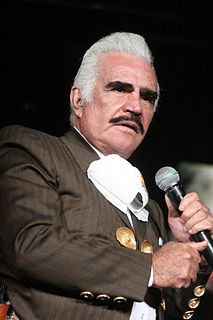
María Guadalupe Araujo Yong, better known as Ana Gabriel, is a Mexican singer and songwriter from Comanito, Sinaloa, Mexico. She first sang on the stage at age six, singing "Regalo A Dios" by José Alfredo Jiménez. She moved to Tijuana, Baja California and studied accounting. At age 21, in 1977, she recorded her first song, titled "Compréndeme". During her long career, she has hits in three different genres of music: Latin pop, Latin rock, and Mariachi.

Vicente "Chente" Fernández Gómez is a Mexican retired singer, actor, and film producer. Nicknamed "El Charro de Huentitán", "El Ídolo de México", and "El Rey de la Música Ranchera", Fernández started his career as a busker, and has since become a cultural icon, recording more than 50 albums and contributing to more than 30 films. His repertoire consists of rancheras and other Mexican classics. He is accompanied live by a mariachi group, but he is not technically a mariachi musician, as he only sings live. Vicente's fame rose after the death of Javier Solís.

Marco Antonio Solís Sosa is a Mexican musician, singer, composer, actor, and record producer.
The Latin Grammy Award for Record of the Year is an honor presented annually at the Latin Grammy Awards, a ceremony that recognizes excellence and creates a wider awareness of cultural diversity and contributions of Latin recording artists in the United States and internationally. The award is given to the performers, producers, audio engineers and mastering engineer for new songs in Spanish or Portuguese language. The songs included on an album released the previous year of submission are also eligible only if they have not been submitted to competition before. Instrumental songs are also eligible. Due to the increasing musical changes in the industry, from 2012 the category includes 10 nominees, according to a restructuration made by the academy for the four general categories: Song of the Year, Album of the Year, Best New Artist and Record of the Year.
The Latin Grammy Award for Album of the Year is an honor presented annually at the Latin Grammy Awards, a ceremony that recognizes excellence and creates a wider awareness of cultural diversity and contributions of Latin recording artists in the United States and internationally. The award is given to the performers, producers, audio engineers and mastering engineers for vocal or instrumental albums with 51 percent of new recorded songs. Albums of previously released recordings, such as reissues, compilations of old recordings and greatest hits albums packages are not eligible. Due to the increasing musical changes in the industry, from 2012 the category includes 10 nominees, according to a restructuration made by the academy for the four general categories: Song of the Year, Record of the Year, Best New Artist and Album of the Year. Beginning in 2018, songwriters are eligible for the accolade if 33% of the playing time are composed by them.
The Latin Grammy Award for Song of the Year is an honor presented annually at the Latin Grammy Awards, a ceremony that recognizes excellence, creates a wider awareness of cultural diversity and contributions of Latin recording artists in the United States and internationally. The award is given to the songwriters of new songs containing at least 51% of lyrics in Spanish or Portuguese language. Instrumental songs or a new version of a previously recorded track are not eligible. Due to the increasing musical changes in the industry, from 2012 the category includes 10 nominees, according to a restructuration made by the academy for the four general categories: Album of the Year, Record of the Year, Best New Artist and Song of the Year.
The Latin Grammy Award for Best New Artist is an honor presented annually at the Latin Grammy Awards, a ceremony that recognizes excellence and creates a wider awareness of cultural diversity and contributions of Latin recording artists, nationally and internationally. The award is given to solo artists or groups that first establish an identity to the public as a performer and release a Spanish or Portuguese language recording during the period of eligibility. In 2012, the Academy announced the category would include ten nominees to reflect changes within the music industry.

The Latin Recording Academy, formally known as the Latin Academy of Recording Arts & Sciences, is a multinational membership-based association composed of Latin music industry professionals, musicians, producers, recording engineers, and other creative and technical recording professionals. They are dedicated to promoting the genre and its makers, both inside and outside the United States. The Academy is internationally known for its annual Latin Grammy Awards. It is headquartered in Miami and is led by president and CEO Gabriel Abaroa.
The Latin Grammy Award for Best Alternative Music Album is an honor presented annually by the Latin Academy of Recording Arts & Sciences at the Latin Grammy Awards, a ceremony that recognizes excellence and promotes a wider awareness of cultural diversity and contributions of Latin recording artists in the United States and internationally. According to the category description guide for the 2012 Latin Grammy Awards, the award is for vocal or instrumental alternative albums containing at least 51 percent newly recorded material. It is awarded to solo artists, duos or groups.
The Latin Grammy Award for Best Long Form Music Video is an honor presented annually at the Latin Grammy Awards, a ceremony that recognizes excellence and promotes a wider awareness of cultural diversity and contributions of Latin recording artists in the United States and internationally. According to the category description guide for the 13th Latin Grammy Awards, the award is for video albums consisting of more than one song or track and is awarded to artists, video directors and/or producers of at least 51% of the total playing time. If the work is a tribute or collection of live performances, the award is presented only to the directors or producers.
The Latin Grammy Award for Best Banda Album is an honor presented annually at the Latin Grammy Awards, a ceremony that recognizes excellence and creates a wider awareness of cultural diversity and contributions of Latin recording artists in the United States and internationally. The award goes to solo artists, duos, or groups for releasing vocal or instrumental albums containing at least 51% of new recordings in the banda music genre.
The Latin Grammy Award for Best Singer-Songwriter Album is an honor presented annually at the Latin Grammy Awards, a ceremony that recognizes excellence and creates a wider awareness of cultural diversity and contributions of Latin recording artists in the United States and internationally. According to the category description guide for the 13th Latin Grammy Awards, the award is reserved for solo artists or duos and they "must compose and interpret 75 percent of the album on their own to be eligible in this category". Additionally, live albums are eligible if they contain at least 51 percent of new unreleased material released within the eligibility period.
Throughout the thirteen-year history of the Latin Grammy Awards, multiple records have been set. This page includes competitive awards only and does not include special awards such as Lifetime Achievement awards or any other non-competitive awards presented by the Latin Academy of Recording Arts & Sciences.
The Latin Grammy Award for Best Regional Mexican Song is an honor presented annually at the Latin Grammy Awards, a ceremony that recognizes excellence and creates a wider awareness of cultural diversity and contributions of Latin recording artists in the United States and internationally. The award is reserved to the songwriters of a new song containing at least 51% of the lyrics in Spanish. Instrumental recordings or cover songs are not eligible. Since its inception, the award category has had one name change. From 2000 to 2012 the award was known as Best Regional Mexican Song. In 2013, the category name was changed to Best Regional Song. In 2016, the award was changed back to Best Regional Mexican Song.
The Latin Grammy Award for Best Latin Jazz/Jazz Album is an honor presented annually at the Latin Grammy Awards, a ceremony that recognizes excellence and creates a wider awareness of cultural diversity and contributions of Latin recording artists in the United States and internationally. The award has been given to artists since the 1st Latin Grammy Awards in 2000 for vocal or instrumental albums containing more than half of its playing time of newly recorded material in Spanish or Portuguese. Latin jazz is a mixture of musical genres, including Afro-Caribbean and Pan-American rhythms with the harmonic structure of jazz. Other jazz genres may also be considered for inclusion by the Jazz Committee.
The 13th Lo Nuestro Awards ceremony, presented by Univision to honor the best Latin music of 2000 and 2001, took place on February 8, 2001, at a live presentation held at the James L. Knight Center in Miami, Florida. The ceremony was broadcast in the United States and Latin America by Univision.
This is a list of notable events in Latin music that took place in 1996.
This is a list of notable events in Latin music that took place in 1997.
This is a list of notable events in Latin music that took place in 1998.








